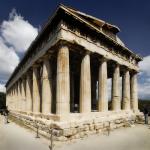|
This section contains 3,338 words (approx. 12 pages at 300 words per page) |

|
The Influence of Etruria.
The city of Rome in 364 B.C.E. was suffering from a plague. Believing the plague to be the result of the anger of the gods, the Romans brought in Etruscan dancers in an effort to appease the gods and gain some relief from the plague's devastation. The Etruscans danced to the music of the aulos, the precursor to the oboe, without any songs or gestures, but their graceful movements entranced the Romans, who began to imitate them. There is much about the Etruscans which is still a mystery—the riddle of their language has not yet been solved—but in the ancient world, they were known for their love of luxury, to which the paintings found in their tombs of the magnificence of their festivals and banquets can attest. In one tomb, the Tomba dei Cacciatori (Tomb of the...
|
This section contains 3,338 words (approx. 12 pages at 300 words per page) |

|




